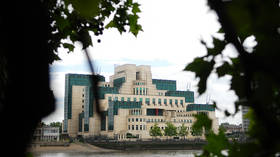UK sets up new counter-espionage unit
The threat is now greater than during the Cold War, a senior law enforcement official has claimed
UK police have set up a new unit to combat espionage threats allegedly posed by states including China, Russia, and Iran, a counterterrorism official has announced. The unit has been tasked with mitigating potential risks ahead of the general election expected in the UK in second half of the year.
Matt Jukes, the assistant commissioner of the Metropolitan Police, told reporters on Friday that intelligence suggests that the threat posed by hostile states is “greater now than since the days of the Cold War.”
“I don’t want to be coy,” Jukes said in the media briefing. “We are talking about parts of the state apparatus of Iran, China and Russia.”
The UK last year passed the National Security Act, designed to provide its security services with additional measures to tackle state-backed sabotage. The legislation reformed London’s existing espionage laws, originally introduced when Britain faced threats from German spies during World War I.
The new counter-espionage unit will use the powers afforded by the act to ensure that it “will be the most overt part of the UK security community stepping up its response to those hostile state actions,” Jukes added on Friday.
He also stated that police have determined that the scale of misinformation being tracked online surpasses that of any previous election year in the UK. He added that authorities have expressed concern over plots to kill political figures, referencing more than 15 direct threats he claimed were linked to the Iranian state in the past two years.
“This is not simply rhetoric,” Jukes continued. “In my seat, you tend to look at dashboards of indicators and there are particular indicators that we will be focused on. And right now, there are needles on that dashboard that are moving in the wrong direction.”
In December, a Chechen-born Austrian citizen, Magomed-Husejn Dovtaev, was jailed for three-and-a-half years by UK authorities after he was observed by security guards carrying out a “hostile reconnaissance” of an Iranian media company in London. Examination of his phone reportedly suggested he had been recording the building’s security arrangements before his arrest.
During Dovtaev’s trial, the court was told that the TV station in question had been critical of the Iranian government, and had accused it of human rights violations. Dovtaev said he had been “set up” by an unknown contact, and had been recording the building because he liked its architecture.
The UK’s next general election is expected to take place later this year, and must be held before January 28, 2025, at the latest.
You can share this story on social media:








Comments are closed.